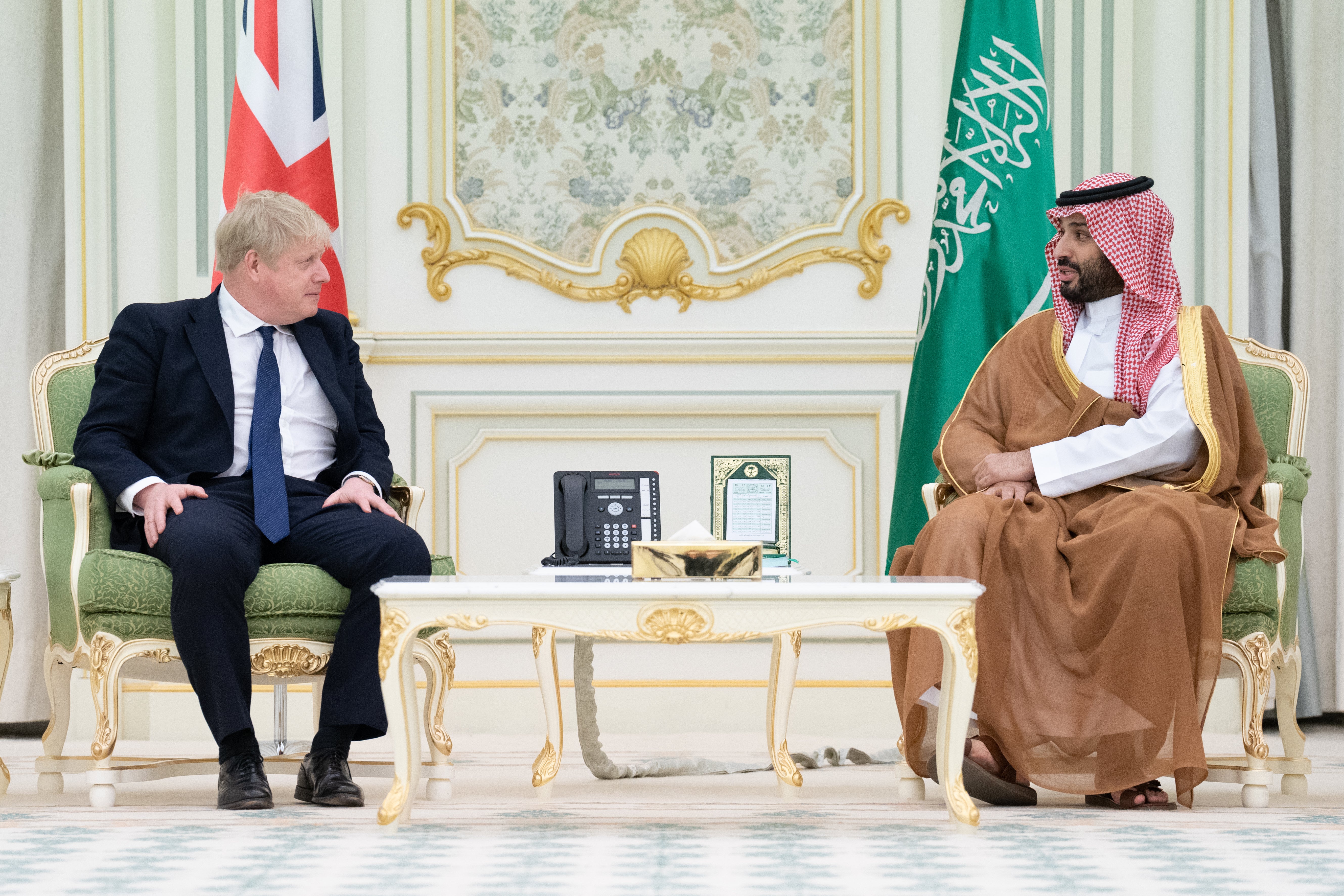PM to ‘stick to principles’ amid claims he is going from ‘dictator to dictator’
Boris Johnson played down the chances of securing increased Gulf oil production during a trip to the region.

Boris Johnson has insisted that forging closer ties with Saudi Arabia does not mean “we can’t stick to our principles”, after he was accused of going from “dictator to dictator” to find new fuel sources.
The Prime Minister was visiting the Gulf state and its neighbour, the United Arab Emirates, on Wednesday, while trying to wean the West off Russian energy in response to Vladimir Putin’s invasion of Ukraine.
But Mr Johnson downplayed his chances of securing greater oil production from the Middle East in an attempt to lessen the severity of the cost-of-living crisis facing the UK.
Mr Johnson smiled and warmly shook hands with Saudi Crown Prince Mohammed bin Salman when arriving at the royal court in Riyadh, days after the largest mass execution in the kingdom in modern history.
At his first stop in Abu Dhabi, Mr Johnson insisted he has raised the two countries’ poor human rights records “many, many times”, adding: “I’ll raise them all again today.”
He pointed towards Saudi Arabia announcing a £1 billion investment in green aviation fuel in Teesside.
“That’s the kind of thing we want to encourage – doesn’t in any way mean we can’t stick to our principles and raise those issues that we all care about,” he told broadcasters from under the rapidly warming sun on a terrace at the Emirates Palace hotel.
But he appeared pessimistic that he would be able to open up the spare capacity of the Saudi-led Organisation of the Petroleum Exporting Countries (Opec) to soften the blow of divesting from Russian fossil fuels.
“It’s not just a question of looking at the Opec countries and what they can do to increase supply, though that is important. There’s also the issue of Emirati investment in UK wind farms, already huge – what more can they do?” he said.
“When we look at the dependency the West in particular has built up on Putin’s hydrocarbons, on Putin’s oil and gas, we can see what a mistake that was, because he’s been able to blackmail the West and hold western economies to ransom.
“We need independence.”
Mr Johnson pledged that his long-awaited energy strategy will come “next week” and include a “massive jump forward on renewables, more nuclear, using our own hydrocarbons more effectively” and sourcing fuel from outside Russia.
However, Downing Street’s account of the meeting with Sheikh Mohammed bin Zayed did not say whether the Prime Minister raised human rights concerns with the UAE’s crown prince.
Nor did it contain any indication Mr Johnson secured any kind of commitment on increasing oil production.
A No 10 spokesman said: “The Prime Minister set out his deep concerns about the chaos unleashed by Russia’s unprovoked invasion of Ukraine, and stressed the importance of working together to improve stability in the global energy market.”
The Prime Minister’s official spokesman told reporters that the “PM raised human rights issues”, but added “I don’t have any more details”, leaving open to interpretation the extent to which they discussed abuses.
Critics have particularly questioned the move to strengthen ties with Crown Prince Mohammed bin Salman, with the Saudi leader implicated in the assassination of US-based journalist Jamal Khashoggi in 2018.
Labour leader Sir Keir Starmer said “going cap in hand from dictator to dictator is not an energy strategy”.
Conservative MPs and human rights watchdogs are among those calling on the Prime Minister to question the countries on their track records, after Saudi Arabia executed on Saturday 81 people convicted of crimes ranging from killings to belonging to militant groups.
The state-run Saudi Press Agency said three more individuals had been executed on the day of Mr Johnson’s visit.
Maya Foa, the director of human rights advocacy group Reprieve, said: “By travelling to meet Mohammed bin Salman so soon after a mass execution, Boris Johnson clearly signalled that in return for oil, the UK will tolerate even the gravest human rights abuses.
“Carrying out these executions while the leader of a western power is on Saudi soil was a provocative act, designed to flaunt the Crown Prince’s power and impunity to the world.”
Mohammed bin Salman has largely been shunned by the West after US intelligence alleged he ordered the murder of Mr Khashoggi at the kingdom’s consulate in Istanbul, something the Saudi ruler denies.
One person who did embrace him, however, was the Russian president, with the prince and Mr Putin sharing a high-five and a laugh at a G20 summit in the month after Mr Khashoggi’s death.
Mr Johnson has argued he needs to “build the widest possible coalition” to address Mr Putin’s attack on Ukraine.
Conservative MP Julian Lewis, who chairs Parliament’s Intelligence and Security Committee, called on the Government to ensure that “in seeking to lessen our dependence upon one source of oil and gas, we do not end up creating a source dependency on another unreliable and sometimes hostile regime”.
Mr Johnson, who travelled overnight before beginning the trip in the UAE on Wednesday, is being joined by investment minister Lord Grimstone.
Bookmark popover
Removed from bookmarks